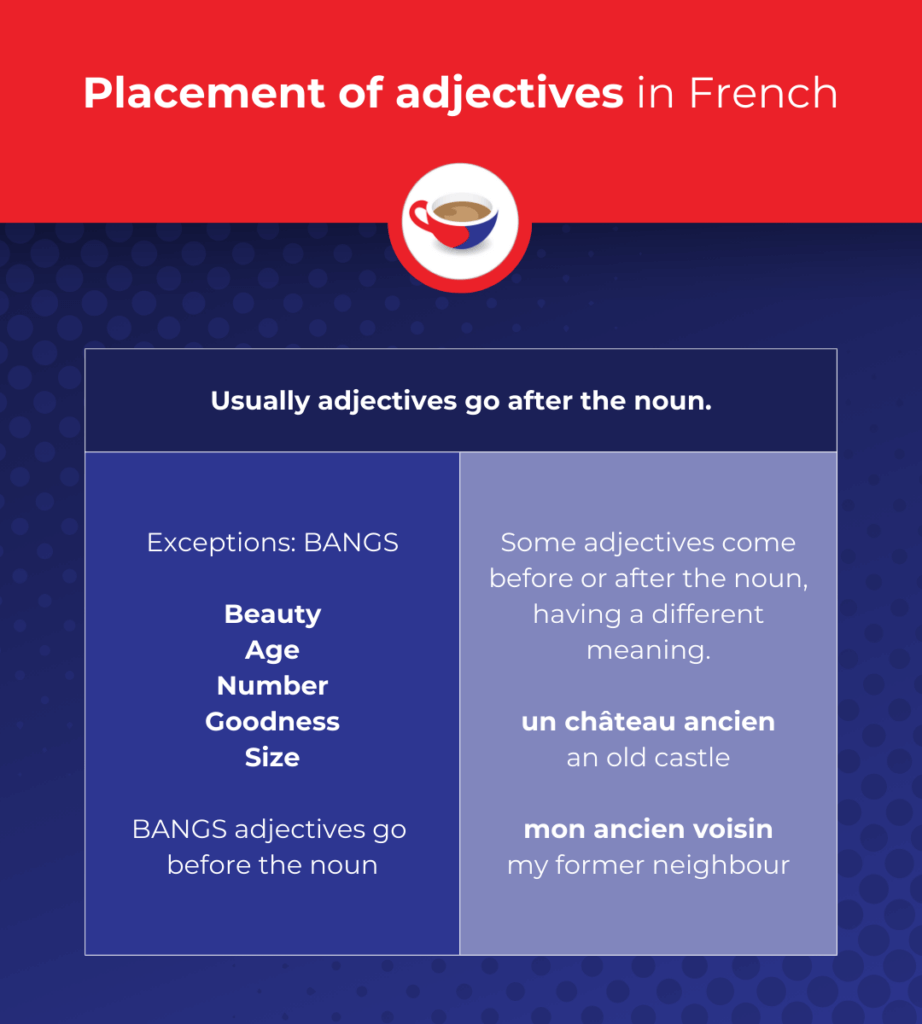Adjectives play a crucial role in adding depth to your French conversations. However, understanding where to place them in a sentence can be tricky for learners.
In most cases, adjectives in French come after the noun they modify, but there are some exceptions which can make this rule seem more like a guideline.
The Coffee Break French Show is a podcast series of bite-sized, friendly conversations that demystify tricky French language topics. In the latest episode, Mark and Max discuss how to get your head around adjective placement.
Let’s dive into the world of adjectives in French and explore when and why some go before the noun.
B.A.N.G.S.
To help you remember which adjectives go before the noun, you can use the acronym BANGS, which stands for Beauty, Age, Number, Goodness and Size.
Beauty
In French, adjectives that convey the idea of beauty come before nouns. For example:
un beau livre
a beautiful book
une belle armoire
a beautiful wardrobe
un bel oiseau
a beautiful bird
une jolie maison
a pretty house
Age
When discussing age, adjectives like vieux / vieille (“old”) come before the noun, as in:
un vieux château
an old castle
une vieille maison
an old house
Number
Adjectives related to numbers, such as premier / première (“first”) and deuxième (“second”), are placed before the noun. For instance:
le premier jour
the first day
la deuxième fois
the second time
Goodness
Adjectives like bon / bonne (“good”) and mauvais(e) (“bad”) are positioned before nouns. For example:
le bon gâteau
the good cake
la mauvaise nouvelle
the bad piece of news
Size
Adjectives describing size, such as grand(e) (“large”) and petit(e) (“small”), also go before the noun. For instance:
un grand canapé
a large sofa
une petite table
a little table
Adjectives with two possibilities
Now, here’s where it gets interesting. Some adjectives can be placed before or after the noun – and their placement alters the meaning. Here are some of them. In each pair of examples, notice how the meaning of the adjective changes, depending on whether it comes before or after the noun.
ancien / ancienne
mon ancienne maison
my former house
la maison ancienne
the old house
cher / chère
Cher Mark …
Dear Mark …
un canapé cher
an expensive sofa
curieux / curieuse
une curieuse recette
a strange recipe
mon ami curieux
my curious friend
dernier / dernière
le dernier mois de l’année
the last month of the year
le mois dernier
last month
vrai / vraie
C’est une vraie Rolex ?
Is it an actual Rolex?
C’est une histoire vraie.
It’s a true story.
propre
C’est ma propre chambre.
It’s my own bedroom.
ma chambre propre
my tidy bedroom
A visual summary

In conclusion
Understanding these exceptions and nuances in adjective placement can be a huge boost in your French fluency and allow you to express your ideas more precisely.
So, whether you’re describing a beautiful landscape or discussing your dear friend, mastering the placement of adjectives will help you convey your thoughts and opinions effectively.
If you found this post interesting, make sure to listen to the full episode with Mark and Max on The Coffee Break French Show. In this series of chats between our language experts, we look at a range of topics for French learners, so make sure to subscribe to our podcast feed and our channel on YouTube.
Plus! To get regular free French lessons in your inbox, you can sign up for our short (coffee-break-sized) email lessons that will help you improve your French. You will also hear from Mark, the founder of Coffee Break Languages, giving advice for language learners at any level. Sign up below!
Happy Coffee Breaking!



